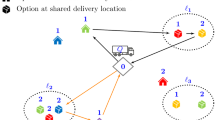Abstract
This paper investigates the impact of problem formulation on Dantzig—Wolfe decomposition for the multicommodity network flow problem. These problems are formulated in three ways: origin-destination specific, destination specific, and product specific. The path-based origin-destination specific formulation is equivalent to the tree-based destination specific formulation by a simple transformation. Supersupply and superdemand nodes are appended to the tree-based product specific formulation to create an equivalent path-based product specific formulation. We show that solving the path-based problem formulations by decomposition results in substantially fewer master problem iterations and lower CPU times than by using decomposition on the equivalent tree-based formulations. Computational results on a series of multicommodity network flow problems are presented.
Similar content being viewed by others
References
A. Ali, R. Helgason, J. Kennington and H. Lall, “Computational comparison among three multicommodity network flow algorithms,”Operations Research 28 (1980) 995–1000.
A.A. Assad, “Multicommodity network flows-a survey,”Networks 8 (1978) 37–91.
W.J. Carolan, J.E. Hill, J.L. Kennington, S. Niemi and S.J. Wichmann, “An empirical evaluation of the KORBX algorithms for military airlift applications,”Operations Research 38(2) (1990) 240–248.
C.E. Chen, “A two-level decomposition algorithm for the stochastic multicommodity dynamic vehicle allocation model,” PhD thesis, Department of Civil Engineering and Operations Research, Program in Statistics and Operations Research, Princeton University (Princeton, NJ, 1990).
I.C. Choi and D. Goldfarb, “Solving multicommodity network flow problems by an interior point method,”SIAM Proceedings in Applied Mathematics 46 (1990) 58–69.
CPLEX Optimization, Inc.,Using the CPLEX Linear Optimizer, 1.2 edition (Incline Village, NV).
G.B. Dantzig and P. Wolfe, “The decomposition algorithm for linear programs,”Econometrica 29 (1961) 767–778.
J.M. Farvolden, “A primal partitioning solution for multicommodity network flow problems,” PhD thesis, Department of Civil Engineering and Operations Research, Program in Statistics and Operations Research, Princeton University (Princeton, NJ, 1989).
J.M. Farvolden, W.B. Powell and I.J. Lustig, “A primal partitioning solution for the arc-chain formulation of a multicommodity network flow problem,” to appear in:Operations Research.
ALK Inc., private communication (1991).
J.L. Kennington and R.V. Helgason,Algorithms for Network Programming (Wiley, New York, 1980).
I.J. Lustig, “The influence of computer language on computational comparisons: An example from network optimization,”ORSA Journal on Computing 2(2) (1990) 152–161.
M.C. Pinar and S.A. Zenios, “Parallel decomposition of multicommodity network flows using a linear-quadratic penalty algorithm,”ORSA Journal on Computing 4(3) (1992) 235–249.
W.B. Powell, “A review of sensitivity results for linear networks and a new approximation to reduce the effects of degeneracy,”Transportation Science 23(4) (1989) 231–243.
R.T. Rockafellar,Network Flows and Monotropic Optimization (Wiley, New York, 1984).
G.L. Schultz and R.R. Meyer, “An interior point method for block angular optimization,”SIAM Journal on Optimization 1(4) (1991).
J.A. Tomlin, “A mathematical programming model for the combined distribution-assignment of traffic,”Transportation Science 5 (1971) 122–140.
Author information
Authors and Affiliations
Additional information
This paper is dedicated to Phil Wolfe on the occasion of his 65th birthday.
Rights and permissions
About this article
Cite this article
Jones, K.L., Lustig, I.J., Farvolden, J.M. et al. Multicommodity network flows: The impact of formulation on decomposition. Mathematical Programming 62, 95–117 (1993). https://doi.org/10.1007/BF01585162
Received:
Revised:
Issue Date:
DOI: https://doi.org/10.1007/BF01585162




